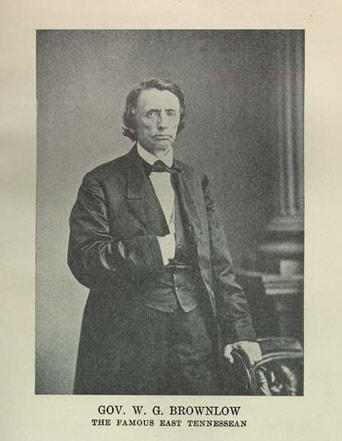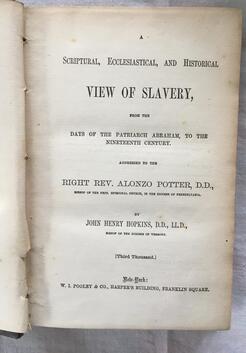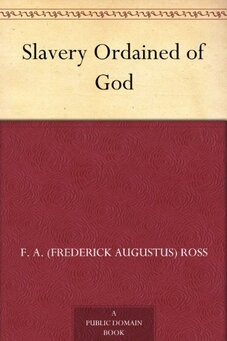|
I wrote this piece when I was about 19 years old. The topic has been in the news again lately so I thought it might be appropriate to revisit. I. In the ugly period of American history preceding (and during) the Civil War, prominent Southerners defended the use of African-Americans as slaves. There were attempts to appeal to reason, given from forums both public and private. Some defended slavery from an economic standpoint; others from an educational standpoint; and yet, such defenses were ultimately had less popular appeal than those arguments that relied on Christianity. Even ministers preached pro-slavery arguments from their pulpits, using Biblical texts to support their stand. How did a text that for many people defines morality – the Holy Bible – come to be used as a defense for a holocaust? Unfortunately, in most cases it was not a matter of twisting the words from the text, but rather reliance upon the strict meanings therein. By the 1850s, pro-slavery arguments no longer defined slavery as a necessary evil, but rather as an absolute good. The advocates based their arguments on the Bible, drawing arguments that seemed most pertinent and convincing to the public at large. One of the arguments most often used was that the African-American race was morally unsalvageable. The Reverend Josiah Priest in 1851 “proved” that blacks were “violent, ignorant, and cannibalistic,” being host to several “unnatural” traits. He quoted Genesis 9: 24-27 to this end: “And Noah awoke from his wine, and knew what his younger son had done unto him; and he said, cursed be Canaan: a servant of SERVANTS shall he be unto his brethren.” This is the familiar (if repulsive) argument that blacks are the cursed sons of Ham. Canaan’s betrayal of Noah is relied upon to form the idea that they are both inherently evil and mentally inferior. According to Reverend Priest, they had been ordained by God to do nothing more than serve; and who was man to deny the word of God? (Priest 31) This was a fairly common opinion among Southerners at the time, and even found a foothold in the North. Conventional wisdom held that blacks were barbaric and incapable of being educated. This opinion is expressed, for example, in Southern Institutes, written by the attorney George S. Sawyer: The social, moral, and political, as well as the physical history of the Negro race bears strong testimony against them; it furnishes the most undeniable proof of their mental inferiority. In no age or condition has the Negro shown the capacity to throw off the chains of barbarism and brutality that have long bound down the nations of that race; or to rise above the common cloud of darkness that still broods over them (Franklin 131). Another who used the Bible to defend servitude was J. Henry Hopkins, a minister who wrote the Scriptural, Ecclesiastical, and Historical View of Slavery. In the book, he argues that slavery may well be a physical evil, causing pain, but is in no way a moral evil. He quotes Exodus 20:17: “Thou shall not covet thy neighbor’s wife, goods, nor his man servant, nor his ox, nor his ass, nor anything that is his neighbors.” Though he takes care to mention that “wives may be offended” by the passage, he notes that the text is clear on the point – a servant is listed among the possessions “owned” by a given master. He also argues that the separation of wife and husband is ordained by God, courtesy of Exodus 21:5-6: “If the servant should plainly say, I love my master, my wife, and my children; I will not go out free; then his master shall bring him to the judges; he shall also being him to the door or unto the door post; and his master shall bore his ear through with an awl, and he shall serve him forever.” Reverend Hopkins remarks: “With this law before his eyes, what Christian can believe that the Almighty attached immortality or sin to the condition of slavery?” (Hopkins 9) The Reverend poses an excellent question, one that should call into question the supposedly high moral status of the Bible. In 1856 Richard Fuller presented a pro-slavery argument resting on two essential points. The first is that slavery is not a moral evil, because it was not “proper and necessary to this original right, that a human being be deprived of any right which is justly his, as an immortal, intelligent, moral, social, and fallen creature. Therefore, a right to the services of man without contract or consent, does not justify any wrong done to his mind, or soul, or domestic relations.” His second point is that the only right removed from a slave is personal freedom; and the removal of another’s personal freedom is “...not necessarily a sin.” (Fuller 158) The specific emphasis on the fallen nature of man supplies the opening needed to come to this conclusion, an idea that depends – of course – on traditional Christianity. Another very important argument from the time is addressed in Christian Doctrine of Slavery. (Note the title. There is no confusion here, no mincing of words.) In this amazing document, Joseph Armstrong states that the enslavement of others never appears as one of the “great sins of Mankind” in the New Testament. In his view, had Jesus wanted to say something about it, he would have mentioned it along with avarice and lust as moral evils. Thus, by not speaking out against it, Jesus is indirectly condoning it. (Armstrong 21) The author also contends that the New Testament was written in slave-holding states, and that one of the letters is addressed to a slave-holder. “Christ and the apostles lived, and labored, and founded the Christian Church, in the midst of slave-holding communities. This, the New Testament itself, as well as concurrent testimony of all history, places beyond all reasonable question.” (Armstrong 10) In a much-publicized event that was recorded and later published, Reverend W. G. Brownlow of the South and Reverend A. Pryne of the North held a debate in 1858. During this debate, Brownlow repeatedly argued that servile “bondage was instituted by Moses, under the inspiration of God.” (43) He also presented a series of statements regarding the equality of humankind, from what he modestly took to be God’s viewpoint. I endorse, without reserve, that much-abused sentiment of an eminent Southern statesman, now no more, Gov. McDeffie, that “slavery is the corner-state of our Republican edifice;” while I repudiate, as ridiculously absurd, that much lauded, but nowhere accredited dogma of Thomas Jefferson, that “all men are created equal.” God never intended to make the Negro the equal of the white man, either morally, mentally, or physically. He never intended to make the butcher a judge, nor the baker a president, but to protect them according to their claims as a butcher or baker. (Brownlow 43)
II. Ultimately, the Bible – and Christianity itself – served a dual purpose for slavers. It provided them with a ready defense against the abolitionists, as well as an opiate capable of reducing insurrections. The slaveowners and Southern ministers recognized that fact, and worked hand-in-hand to encourage Christianity among blacks, for the express purpose of keeping them down. William Pope Harrison’s Gospel Among the Negroes is a document of the missionary work undertaken during the period, making a case for the “calming factor” of Christianity in minimizing slave rebellion. He takes note, for example, of a 1712 slave insurrection in New York. A school had been recently established for the religious education of African-Americans, and those enrolled in the school were immediately suspected. However, it was soon discovered that none of those who had been enrolled in the school were involved. For Harrison, this strengthened his theory that Christianity could aid in “domestication.” Harrison also made note of the considerable population difference between whites and blacks in Southern states: ...in the states of South Carolina and Georgia, there were large sections of the country in which blacks outnumbered the whites by five to one. What was it that preserved the authority of the masters, if it was not the moral power exerted by a superior race? Could this power control the thousands who were exasperated against the hundreds of whites, if there were no ties, no kindness, no respect engendered by human treatment, and uniform justice among the masters? (Harrison 112-113) There were several councils that met during the Antebellum period to discuss the religious instruction of blacks. One in particular, a committee that met in South Carolina in 1845, I will use as an example. The committee was formed among slaveowners and concerned the need for “increased encouragement of Negro attendance at church.” In the actual transcript of the meeting, they focus on the teaching of “Christian light and love,” and remarks that the “true interest of master and slave, both spiritual and temporal, are...closely associated.” (Huger 8-9) Would we most naturally look for effective labour, in the dissolute, the unprincipled, and the discontented; or in those who are godly and honest, regular in their habits, and satisfied with their condition?...Yes, we know of no other means of accomplishing ends so desirable, but those which divine mercy has made the subjects of express commandment; and of which love to God and love to our neighbour are the embodiment. (Huger 9, Italics mine) Clearly the slaveowners recognized the benefits of Christianizing the slave populations. Not only would they be making them more docile and less likely to revolt, but they might also possible increase their performance. The motivation behind this is just astonishing. III. Christian ethics were undoubtedly important to the preservation of the slave industry in the Antebellum South. The questions remains, however – just how important was it? One could argue that the slaveowners were reaching for any argument that might preserve their business (and they were) and so anything would have served their purposes. Even then, why would they so readily and easily draw upon their religious faith to defend their actions? The answer lies in Christianity itself and the far-reaching effects it had on the populace. With Christianity as the basis for every child’s moral education, appeals to the Bible had the strongest effect on public opinion. After all, part of the reason Native Americans and African-Americans were treated as savages was due to their non-Christian status. Conventional wisdom held that they would not be saved come Judgment Day, so why think twice about using or eliminating them on Earth? Christianity was the easiest and most germane outlet for anti-abolitionist propaganda, with ministers serving as public go-betweens. In From Slavery to Freedom, John Hope Franklin writes that the “turn-the-other-cheek philosophy” helped keep slave insurrections from occurring. This adoption of American religious ideology by the African slaves ended up serving the purposes of slaveowners to no small effect; in the Bible, of course, the lowest order of people are the most holy and will be saved. It is interesting to note that the pattern of appeals to Christianity is precisely the same as that always adopted by those in power. A similar thing occurred when Darwinism took root in the public consciousness, as Social Darwinists began to argue that “survival of the fittest” applied to corporations; they used Darwinism to defend rapaciousness. There is a key difference, however. The difference is that the Social Darwinists did not read The Origin of Species very carefully, or they would not have argued as they did; they misconstrued the text. That is not the case with Christianity. It is not hard at all to find defenses for slavery in the Bible, as the quotes within this article show. And, of course, it is absolutely true that the Bible is generally a pro-slavery document, containing much material that defends the status quo, whatever that may be, as trade for a Heavenly payoff. One important cultural note to remember is that the heavy reliance on Christianity for anti-abolitionist arguments came from desperation. After all, divorced from religious context, what arguments are to be made for enslaving an entire people? Appeals to reason have far less currency than appeals to human emotion, especially when they come from a church pulpit. In the end, it is a simple fact that Christianity was a major contributor to one of the most disgusting crimes in history, and this contribution did not arise from a misuse of the text. Rather, it emerged from a careful reading of it. SOURCES
Brownlow, W. G. Ought American Slavery Be Perpetuated? (1858) Cobb, Howell. Scriptural Examination of the Institution of Slavery in the United States; With Its Objects and Purposes. (1856) Fuller, Richard. Domestic Slavery Considered As A Scriptural Institution. (1856) Hopkins, John Henry. Scriptural, Ecclesiastical, and Historical View of Slavery. (1864) Huger, Daniel. South Carolina Meeting on the Religious Instruction of the Negroes. (1845) Ross, Augustus Fred. Slavery Ordained by God. (1857)
0 Comments
|
AuthorThis is Joe Green's blog. Archives
August 2021
Categories |



 RSS Feed
RSS Feed
